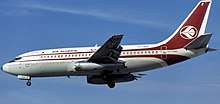Air Algérie Flight 702P
Air Algérie/Phoenix Flight 702P, named Oasis and registered 7T-VEE, was a Boeing 737 owned by Air Algérie and leased by Phoenix Aviation which crashed on 21 December 1994 near Coventry Airport, England. All five on board were killed.
 7T-VEE, the aircraft involved in the accident | |
| Accident | |
|---|---|
| Date | 21 December 1994 |
| Summary | Pilot error |
| Site | near Coventry Airport, Coventry-Baginton, England, United Kingdom 52.38443°N 1.45289°W |
| Aircraft | |
| Aircraft type | Boeing 737-2D6C |
| Aircraft name | Oasis |
| Operator | Air Algérie |
| Registration | 7T-VEE |
| Flight origin | Amsterdam Airport Schiphol, Amsterdam, Netherlands |
| Stopover | East Midlands Airport, East Midlands, England, United Kingdom (unplanned) |
| Destination | Coventry Airport, Coventry-Baginton, England |
| Occupants | 5 |
| Passengers | 2 |
| Crew | 3 |
| Fatalities | 5 |
| Survivors | 0 |
History
On the day of the accident, the aircraft departed Amsterdam for a routine flight to Coventry, where live animals were to be loaded on board for export to the Netherlands and France. Weather at Coventry was poor and deteriorated steadily during the day; by the time the aircraft reached the Coventry area, the runway visual range for the main runway at Coventry Airport was only 700 metres. The aircraft was not properly equipped to receive the updated radio-navigational broadcast for the runway in question, so the pilots elected to be guided in by a radar controller using Surveillance Radar Approach (SRA). This was unsuccessful and the captain elected to call a missed approach and eventually divert to the East Midlands Airport.[1]
Approximately 90 minutes after landing at East Midlands, visibility at Coventry improved significantly. The flight departed East Midlands at 9:38 local time in order to make a second attempt to land at the scheduled destination. During the second SRA-guided approach, the aircraft descended well below the glide slope and collided with an 86-foot (26 m)-high electricity transmission tower situated on the extended centreline of the runway approximately 1.1 miles (1.8 km) from the runway threshold. The collision caused severe damage to the left engine and to the structure of the left wing; the aircraft rolled to the left and dropped, clipping a house before crashing into an area of woodland and catching fire.
Aftermath
The Air Accidents Investigation Branch (AAIB) determined that the accident was caused by the flight crew allowing the aircraft to descend significantly below the minimum descent height for the approach without gaining sight of the approach lighting or runway threshold. The AAIB also found that the crew had failed to cross-check altimeter height indications during the approach, that the non-handling pilot failed to call out the minimum descent height as the aircraft reached that altitude, and that the flight crew's performance had been impaired by the effects of fatigue.[2]
A brass plaque remembering the event is now located in Middle Ride, close to the crash scene, which was erected on the 10th anniversary of the accident by the Willenhall Wood Residents Association.[3]
References
- Ranter, Harro. "ASN Aircraft accident Boeing 737-2D6C 7T-VEE Coventry-Baginton Airport (CVT)". aviation-safety.net. Retrieved 2 March 2020.
- "Report on the accident to Boeing 737-2D6C, 7T-VEE at Willenhall, Coventry, Warwickshire on 21 December 1994" (PDF). Air Accidents Investigation Branch. Archived (PDF) from the original on 25 January 2013. Retrieved 21 November 2008.
- "Aeroplane crash dead remembered". BBC News. BBC. 21 December 2004. Retrieved 11 June 2011.